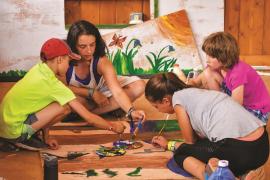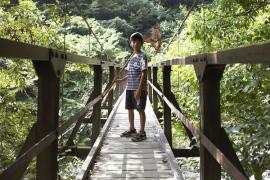“Great ambition and conquest without contribution is without significance.”
~ The Emperor’s Club
“Because we love it” is the common answer I hear when I ask motivated camp staff why they stay up late working on projects, take the time to do extra things, or strive to make activities special — even during the final weeks of camp when everyone is tired. Last summer, while conducting staff trainings, I observed staff who possessed the capacity to give of themselves, in big and small ways, to make a positive difference in the lives of the campers they served.
While the innovative, interactive schedules of camp are physically and emotionally demanding, there are ways and great reasons to stay motivated to greet each day with the unconditional desire to do a great job.
How well you understand the relationship between your effort and the ensuing change it can cause will determine a level of understanding I call “camp awareness.” To be successful, you must learn how to excel at your job by doing the fundamentals at an expert level. If it is your first year, ask questions, and don’t be afraid to try new leadership strategies. Many of the opportunities to affect change are derived by camper relationships, so make sure you take the time to get to know your campers well. If you are returning after one or more years, you can broaden the scope of how you do what you do by building on the skills you learned last summer.
Remember, you are not the only one who can do this job. The camp has other talented staff who may be as experienced, have more institutional knowledge, or maybe even achieved a higher level of education. What will set you apart is your desire and ability to take activities or special events to another level by adding, subtracting, or altering the format. The hidden secret to making a change is frequently found in your behavior rather than the event itself.
When you are faced with a new activity or the challenge of camper management, you will most likely have an impulse to respond in a way that is familiar to you. We all have automatic behaviors, habits or processes we use to resolve issues. But flexibility is the foundation for having “camp awareness.” The key is to look at the situation and act appropriately even when your default behavior would naturally dictate you do something else. Staff who are aware their automatic response may not be the best reaction can override the instinctual behavior and replace it with a more productive option.
Staff who have camp awareness are the people who can make things happen. In my experience, it is rare to find individuals who always want to do more for the right reasons. But while conducting a training at an overnight camp, I noticed three arts and crafts staff working on a project late at night, and when I inquired why they were putting in such long hours, they responded (in unison), “Because we love it.”
While working on a special project for a camp director last August, I met a ropes course counselor who was doing trail maintenance using a headlamp. I observed this same person earlier in the day assisting at sports, cleaning up after dinner, and helping some campers learn a song. When I asked why he seemed to be everywhere, he replied, “Because I love it.”
At a day camp this past summer I saw two counselors in 95-degree heat lead their group all day, help with play practice after camp, and then work a special overnight event that included leading wacky activities, serving meals, spending the night, and waking up to lead their group the next day. When I asked them if they were tired, they replied, “Yes, but it’s okay because we love it.”
So, what creates this desire to do more?
The tools discussed for “camp awareness” (effort/change ratio, getting to know your campers, altering the format, evaluating your default behavior, and being flexible) now set the stage for identifying the qualities you need to be successful. While no list of characteristics is absolute for obtaining success, these suggestions are both obtainable and within your control.
- “Because we love it” is a statement of passion. Longtime staff, or “lifers” as they are often called, will sometimes say they always knew they wanted to work in camp, while others must discover this type of work. In truth, if you ask any camp professional why they are successful, you will likely hear that it is their passion.
- Work hard while having fun. Almost all memorable camp activities or special events happened because someone worked really hard putting it together. When preparation can be done in a fun way, the long hours are not only meaningful, but it makes you want to repeat the process again.
- Have outside interests but focus on camp. You want to build your expertise so making decisions does not consume all your time. This will allow you the freedom to do extras without compromising your home or camp responsibilities. You need to have a good idea how the camp operates while being able to focus on your group or specialty area.
- Have the courage to try new things. Successful staff work to confront fears — both their own and those that hold others back. The two biggest problems in realizing success are fear and doubt. What you practice in your life becomes habit. Make it a practice to challenge your comfort zone so your former fear becomes a learning opportunity. Try a new activity and learn it alongside your campers. Share with them how you are feeling, because this example of activity-based communication is the exact process you want them to follow.
- Be committed. Believe in the camp’s mission. Know your skill set is enough to make a difference. If you trust in yourself, you will be an intentional point of transfer, meaning your actions and words will help the camp experience become a reality for campers in their everyday lives. Your commitment is a critical part of how campers interpret their camp experience when they are home and facing new social and academic challenges.
- Make the effort to be prepared. Learn as much as you can (rosters, medical concerns, activity locations, policies, etc.). This allows you the time to do things the average counselor is not likely going to do. Make camper-friendly choices like listening when you are tired or teaching face-to-face communication instead of texting.
- Share your tripod. Put yourself in a position to experience success by articulating your value system. Decide what is important to you and implement those principles that support the camp’s mission. Share your philosophy throughout the day as long as it is age and activity appropriate. Finally, teach positive relationship skills. Go out of your way to model appropriate personal boundaries while promoting positive camper interaction.
Now that you know the tools for camp awareness and you understand the characteristics needed to be successful, how can you become a staff member who does things because you love doing them? You don’t get good at anything without practice, and often counselors fail to make changes in their words or actions even when they are motivated to alter a default behavior. Good intentions are often displaced by busy schedules, pressing issues, or unexpected tasks, so behavior changes don’t always happen. Steve Jobs says, “Your work is going to fill a large part of your life, and the only way to be truly satisfied is to do what you believe is great work. And the only way to do great work is to love what you do” (Yang, 2014).
Camp staff who intentionally develop the skills to master their job make the time to fine-tune their behaviors. They put words/ideas into actions by telling other staff what they are working on (i.e., communication) — becoming a better listener and having coworkers challenge them to choose an appropriate response; or leading inclusive meetings by involving others in the solution or understanding viable options for discipline instead of making idle threats that have no merit.
When everybody is excited about something or there is a desire to accomplish a common task, loving what you do is evident. The challenge is to be able to do these things when you are tired, multitasking, or trying to implement something that is not immediately accepted. Imagine for a moment that the default staff behavior was energetic and positive every time challenging tasks were assigned. While it is illogical to believe this response would happen every time, it is plausible to believe one person who promotes the mantra “we want to do this because we love it” can change the culture.
Sometimes a first-year staff member can revitalize an event or program because of their energy or perspective. Last summer, I observed a long-forgotten sustainability program at a day camp become the most exciting focus for a week and beyond. Because of the efforts of one new specialist, the amount of leftover food after lunch decreased by 75 percent, and the total weight of trash decreased by 50 percent. The whole camp was excited about conservation and what they could do to “beat” the other groups by generating the least amount of waste. This increased the interest in gardening and led several groups to challenge camp owners about their existing procedures regarding food service.
This example may not be reflective of your skill set, but it does point out how varied the opportunities can be for you to make a difference. Your ability to affect the camp community depends on several factors, including awareness, program needs, time of day, weather, temperature, and location, among others. What you are looking for is an opportunity to show your ability beyond normal job responsibilities by adding effort, ideas, or expertise. Unless you are extraordinarily gifted at working through day-to-day camp situations, you will have to initially go with your strengths to create a wow factor. Practice improving small scenarios so you can build up camper trust through repeated actions of success. Then, when the situation arises, take a chance to make a good activity great. Push through your initial apprehensions and dare to be a counselor the campers will remember.
Most camps have a few counselors who are the driving force behind great programming or camper achievement. All too frequently I observe these staff putting forth a lot of effort while many others simply go through the motions. It is easy to justify this by saying those staff who are really making a difference have been here for many years, or they are naturally outgoing. But the simple truth is anyone can create an amazing memory, at any level, by deciding need is greater than complacency.
This summer you will be presented with three options for making a difference.
- It is perfectly acceptable to be functional at your job. This initial level of participation has a place in the hierarchy of necessity. If that maximizes your ability, then strive to improve your process.
- If you want to take on more responsibility, be careful to stay within your limits so you set yourself up for success. Talk to senior staff and discuss ideas on how you can begin the process of expanding your impact.
- Challenge your comfort zone by volunteering to help or lead events. Be willing to sacrifice time and effort to make significant contributions to a group, division, or all camp activities.
The real question is why not you? What will prevent you from maximizing your leadership potential? Think for a moment about the expressions on the campers’ faces when you exceed their expectations. Those smiles are irreplaceable, and you helped create them by doing more. Your effort and the ensuing change will allow you to have camp awareness. Make cheerfulness your default behavior, and be open to including other staff in your transformation process. Take the time to master your essential job functions even if you are tired. Decide what your level of participation is going to be and raise it until you are out of your comfort zone. The camp season is short, so come to camp ready to exceed camper expectations at whatever leadership level you choose. Once you practice the personal fulfillment of maximizing your potential, you will know just how powerful the camp experience can be. And when this happens, you, too, will a part of a staff group who responds, “Because we love it.”
Top Ten Reasons to Stay Motivated at Camp |
|
Photo courtesy of Camp Skylemar, Naples, Maine
References
Hoffman, M. (Director). (2002). The emperor’s club [Motion Picture]. United States: Universal Pictures.
Yang, J. (2014, October 27). 12 inspiring quotes about doing what you love. Huffington Post, The Blog. Retrieved from huffingtonpost.com/jinna-yang/12-inspiring-quotes-about_1_b_6042312.html
Greg Cronin, MPA, CCD, of GC Training Solutions, is a certified camp director, former ACA National Board Member, 29-year ACA section board member, author, and staff trainer. With over 35 years of staff training experience, he works with camps, schools, churches, and businesses all over the country. To find out more about dynamic staff training, request a list of workshops, or to reserve dates, please contact Greg directly at 703.395.6661 or email [email protected].
Discussion Questions |
|



